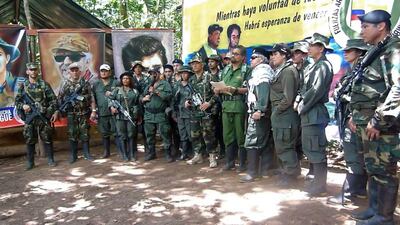Three years after a peace deal ended the five decades of conflict in Colombia, a group of former rebels are threatening to launch a new offensive.
Two former rebel commanders from the Revolutionary Armed Forces of Colombia (FARC), known by their aliases Ivan Marquez and Jesus Santrich, appear in the 32-minuet YouTube video announcement of the offensive because they said the terms of the peace agreement were not being fulfilled.
"This is the continuation of the rebel fight in answer to the betrayal of the state of the Havana peace accords," said Marquez, dressed in olive fatigues and surrounded by armed fighters. "We were never beaten or defeated ideologically, so the struggle continues."
Marquez was a key negotiator of the peace agreement signed in 2016. He went missing last year after his nephew was arrested and taken to the United States to cooperate with drug-trafficking investigators.
The announcement, which Marquez said was filmed in Colombia's Amazon, comes amid severe challenges for the complex accord, including the murder of hundreds of former rebels and human rights activists, delays in funding for economic efforts by ex-combatants, and deep political polarization.
The group's objective is the installation of a government that will support peace, Marquez said. It will fight corruption and fracking and demand payments from those participating in illegal economies and from multinational companies, he said.
Security sources said the force commanded by Marquez could number 2,200 fighters.
President Ivan Duque was elected on a platform to change parts of the deal, but has failed to get congressional or judicial support to do so. He has repeatedly said former guerrillas with a true desire to disarm will be supported.
There was no immediate reaction from the government.
"The great majority remain committed to the deal, despite all the difficulties and dangers," former FARC commander Rodrigo Londono, known as Timochenko, said on Twitter. "We are with peace."
Mr Londono is now a leader within the Revolutionary Alternative Common Force, the FARC political party born out of the peace accord.
The dissident group will seek to coordinate with fellow leftist rebels the National Liberation Army (ELN), Marquez said, and will not use kidnapping and ransom as a source of financing.
"All of this, this trick, this betrayal, this perfidy, the unilateral modification of the text of the accord, the unfulfilled commitments on the part of the state, the judicial set-ups and insecurity, have obliged us to return to the mountains," said Marquez, whose birth name is Luciano Marin.
Colombian President Juan Manuel Santos won the Nobel Peace Prize in 2016 for his part in brokering the deal.
Some 13,000 FARC members, including 7,000 combatants, demobilized under the 2016 accord signed in Cuba, many joining reintegration efforts or returning home to their families.
Others remained armed or formed new units, continuing lucrative drug trafficking, illegal mining activities or attacks on the military.
"The start of a new guerrilla group by Ivan Marquez is a politically significant event, but at this point does not alter the country’s security profile or security risks. Most likely members of the group aren't even in Colombia to begin with," said Sergio Guzman, founder of Colombia Risk Analysis.
Many active rebels are believed to base themselves in neighbouring Venezuela.
Santrich, whose birth name is Seuxis Pausias Hernandez, is wanted in extradition by the United States for alleged conspiracy to export 10 tonnes of cocaine.
The commander Hernan Dario Velasquez, who goes by the alias "El Paisa," also appears in the video.
More than 260,000 people have been killed and millions displaced during Colombia's conflict between the government, rebel groups, crime gangs and right-wing paramilitaries.

